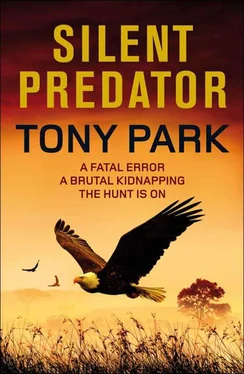Tony Park - Silent Predator
Здесь есть возможность читать онлайн «Tony Park - Silent Predator» весь текст электронной книги совершенно бесплатно (целиком полную версию без сокращений). В некоторых случаях можно слушать аудио, скачать через торрент в формате fb2 и присутствует краткое содержание. Жанр: Триллер, на английском языке. Описание произведения, (предисловие) а так же отзывы посетителей доступны на портале библиотеки ЛибКат.
- Название:Silent Predator
- Автор:
- Жанр:
- Год:неизвестен
- ISBN:нет данных
- Рейтинг книги:5 / 5. Голосов: 1
-
Избранное:Добавить в избранное
- Отзывы:
-
Ваша оценка:
- 100
- 1
- 2
- 3
- 4
- 5
Silent Predator: краткое содержание, описание и аннотация
Предлагаем к чтению аннотацию, описание, краткое содержание или предисловие (зависит от того, что написал сам автор книги «Silent Predator»). Если вы не нашли необходимую информацию о книге — напишите в комментариях, мы постараемся отыскать её.
Silent Predator — читать онлайн бесплатно полную книгу (весь текст) целиком
Ниже представлен текст книги, разбитый по страницам. Система сохранения места последней прочитанной страницы, позволяет с удобством читать онлайн бесплатно книгу «Silent Predator», без необходимости каждый раз заново искать на чём Вы остановились. Поставьте закладку, и сможете в любой момент перейти на страницу, на которой закончили чтение.
Интервал:
Закладка:
It was hot. It was dry. He found himself drinking water by the litre. When he went to the bathroom at the service station he noticed the skin of his right arm and the right side of his face — the parts of him most exposed while driving — were brick red. He put on extra sunscreen when he got back in the truck, but it seemed little could protect him against the elements. He ran a hand through his damp hair and felt grit. The distances he was travelling staggered him when he overlaid them on England, Scotland and Wales. Sannie had warned him he would see ‘MMBA — miles and miles of bloody Africa’, and she was right.
The humidity climbed as he neared the Zambian border. Here the land started to dip into the Zambezi River valley. He crossed the frontier on a ferry at Kazungula, and a rare breeze off the water cooled him momentarily as he leaned on a safety railing and watched a pied kingfisher hover above the surface before plunging in for the kill. The bird emerged and flew off, its beak empty. Would his hunting trip be equally fruitless?
He reckoned there was a fifty-fifty chance that the theory coalescing in his mind was right. He wouldn’t know for sure until he made it to Malawi, and there was still another whole country to cross first.
Zambia was poorer, edgier and more run-down than the pleasantly prosperous backwater of Botswana or busy, flashy, manic-depressive South Africa. Here and there were signs of development, either through foreign aid or an influx of tourist dollars, but elsewhere the country had the feel of an old elephant down on its knees, struggling to stand upright again. On the Land Rover’s radio was news in English about Zambia’s recent election. The opposition had been defeated and was claiming corruption on the government’s part. A spokesman warned of protests on the street and the announcer mentioned an increased police presence was planned to counter the demonstrations. Tom got the feeling that democracy was still more of an ideal than a reality in many parts of Africa.
On the way into Livingstone, the closest town on the Zambian side of the mighty Victoria Falls, he passed signs to a new five-star hotel and a shopping centre complex under construction, but in the town itself he watched a security guard beat a street urchin with a wooden baton. The boy, dressed in ragged shorts and a too-big T-shirt, ran off, blood running through the fingers pressed to his scalp.
Tom had no time or inclination to visit the Victoria Falls, though in his mind he briefly played out a scene in which he and Sannie and her kids returned to go sightseeing. On the road out of Livingstone he watched a pair of young boys riding towards him in a cart constructed from the rear tray of an old pickup, pulled by a pair of battered, scarred donkeys. They whipped the animals in a cruel frenzy to get out of the way of a shiny new Mercedes-Benz which roared past them and swerved to avoid a head-on with Tom at the last second. Tom leaned on the Land Rover’s horn, but the gesture was wasted. The Merc had probably been travelling at close to two hundred, he thought. This stretch of road was good, courtesy of the Danish government, according to a road sign, but half an hour later Tom was dodging potholes as deep as his forearm.
It seemed the roads in Zambia were as much a footpath as a vehicular route. As he drove he passed a constant procession of people walking to or from school or work, or from one poverty-afflicted village to another. A young man with legs and arms like twigs and dressed in a hessian sack, a look of madness in his eyes, was followed by a man in a suit and tie, riding a pushbike. Women in brightly printed wraps with babies on their backs walked on the roadside, ignoring him and other traffic, carrying themselves with the aloofness and grace of giraffes, while children in starched uniforms yelled and waved frantically as the Land Rover rumbled past them.
Tom lost count of the number of police checkpoints he passed through. Sannie had warned him that, apart from border crossings, these would be his biggest inconvenience. She was right, and he tried to remember to be patient and friendly. He stopped for the night in a camping ground situated on a farm near a small town called Choma, on the Livingstone to Lusaka road. As he was the only camper, he used the opportunity to take Sannie’s nine-millimetre from the toolbox and strip it and clean it.
Tom rose at four-fifteen and pulled on nylon running shorts, a T-shirt and his trainers. He figured it was safe to leave the vehicle where it was, so he did twenty minutes of stretching, then set off for a run. He followed the dirt track, which led from the farm to the main road, keeping a careful eye on the uneven ground. He didn’t want to twist an ankle. Once on the main tar road he settled into a rhythm, breathing deep and slow. At this hour there were few cars and for long stretches it seemed like he was the only person in Africa. The sun peaked above the flat horizon after about half an hour, turning the open grasslands on either side of him the colour of molten gold. He checked his watch, turned and headed back. A gaggle of children in pressed maroon and white uniforms, presumably from families employed on the commercial farm, giggled and pointed at him as he passed. He waved and smiled. It felt good to be exercising again. In the coming days he needed to be sharper than he ever had in his career — both mentally and physically. Back at his campsite he finished off with fifty push-ups and a hundred sit-ups. In the shower he enjoyed the feel of the strong spray pummelling his invigorated muscles. When he dried himself he caught sight of his face in the mirror. He nodded and said out loud, ‘Ready.’
28
Immigration officer Goodenough Khumalo put a hand over his mouth to stifle a yawn and said, ‘Next.’
The man at the head of the non-residents’ queue was tall and white, with jet black hair and a moustache. Goodenough watched him as he walked, noting his smile and the way he looked him in the eye. Nothing to hide? We’ll see, thought Goodenough. The ones to pay close attention to, he had learned, were those who fidgeted nervously and looked every which way and those who seemed too full of confidence. Behind the man were at least another forty or so people from the South African Airways flight from London. Good-enough was in no particular hurry — he had nowhere else to go.
‘Good morning, how are you?’ the man said as he stepped up to the high counter. He wore a blue cotton shirt, navy blazer and tan trousers.
‘Fine, and you?’ Goodenough said, taking the British passport and sliding it towards himself.
He looked at the photo and glanced up at the man. A match. He even had the same moustache. Goode-nough checked the issue date. The passport was only a month old. He flicked through the pages. The man had been to South Africa once already since the new document was issued, only a few weeks ago. He used his barcode scanner and the man’s details flashed up on the screen in front of him. The green sticker in the passport was a three-month visa. It was still well in date, so the holder could pass in and out of South Africa as often as he or she wished during that period. Each time, the sticker would be scanned and the entry/exit date electronically registered on a computer.
‘Mr Daniel Carney, your visa is still valid.’
‘Yes,’ the man said, smiling.
‘How long do you stay in South Africa this time?’
‘Just three days.’
Goodenough looked at the white immigration arrival form which Carney had completed. ‘I see you are a freelance journalist. Are you here on business or pleasure?’
‘Mostly pleasure. In fact, I’m in transit. Though I might write a story on your country’s preparations for the soccer World Cup. I think it’s fantastic that Africa’s finally getting to host it, don’t you?’
Читать дальшеИнтервал:
Закладка:
Похожие книги на «Silent Predator»
Представляем Вашему вниманию похожие книги на «Silent Predator» списком для выбора. Мы отобрали схожую по названию и смыслу литературу в надежде предоставить читателям больше вариантов отыскать новые, интересные, ещё непрочитанные произведения.
Обсуждение, отзывы о книге «Silent Predator» и просто собственные мнения читателей. Оставьте ваши комментарии, напишите, что Вы думаете о произведении, его смысле или главных героях. Укажите что конкретно понравилось, а что нет, и почему Вы так считаете.












